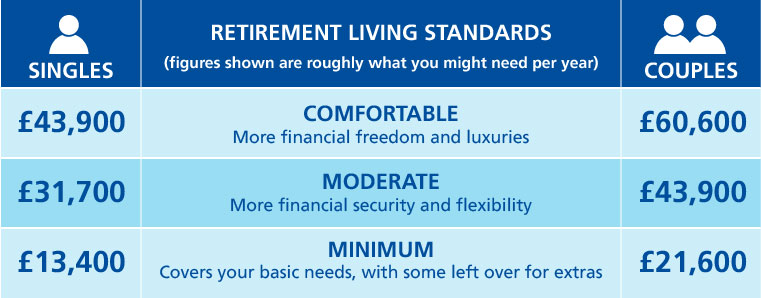News updates
Read the latest updates from the world of pensions and see how they affect you as a member of the Scheme.
Read the latest news about the Scheme and your pension below.
You can also visit the blog for a deeper dive into a variety of pension topics.

The Retirement Living Standards (RLS) are a retirement-planning tool
Developed by Loughborough University and Pensions UK, the RLS are a practical tool to help people understand what life in retirement can look like at 3 different levels: minimum, moderate and comfortable.
They take into account if you live alone or with another person, and consider things like:
- the current cost-of-living
- lifestyle choices, such as holidays, clothing and transport
- food and drink, and
- household costs, such as council tax, energy and water
The 2025 RLS updates

Compared to the huge increases they’ve seen in the previous 2 years, 2025 has seen smaller increases to the amounts required for moderate (+£800 per year) and comfortable (+£400 per year) standards of living, and a reduction (-£1000) to the amount required for the minimum living standard, for a single person in retirement. If you live in London, the costs are higher and can be found here.
The standards reflect changes in public behaviours, and the cost-of-living
The changes are due to a fall in the energy price cap until October 2024, and modest food price rises. Groups living to the minimum standard made cutbacks to some expenditure items, such as technology, hairdressing services, clothing, charity donations and taxi transport, and increased their budget for rail fares (from £100-£180 per year).
Amounts required to cover the weekly costs of domestic fuel have fallen across all standards by more than a quarter, for all household types. For couples living at the minimum standard, the weekly domestic fuel budget has fallen by £12.44. The moderate and the comfortable weekly budgets have fallen by £16.74. For singles living at the minimum standard, the weekly domestic fuel budget has fallen by £8.82 and the moderate and comfortable have fallen by £15.38.
The RLS can help you plan for life after work
Based on research-backed information, they provide real-life examples for people to aim towards, empowering savers to take action by showing the level of expenditure required for different standards of living. And although all circumstances are different, and they won’t exactly reflect yours, they’re there to be used as a guide.
The standards assume you won’t have a mortgage or rent in retirement
If this won’t be the case, you’ll need to add housing costs to your budget.
Using the RLS, your digital planning tools and your member website, you can take steps to secure the future you deserve
You can use the Retirement Budgeting Calculator
This considers things like where you live, holidays and your social life, to guide you on how much you’ll need in retirement.
You can think carefully about what you can afford and create a realistic savings goal
Research shows that by having a clear savings goal, it brings you clarity, inspires action, and you are more likely to achieve your goal.
You can check if you’re on track towards your goal
You can request an estimate of your current savings or view your latest Annual Benefit Statement (ABS), in your online account. If you’re a DC member, you can see how your investment funds are performing, or switch investment funds if you’d like to.
You can think about saving more by making Additional Voluntary Contributions (AVCs)
These are tax-free up to certain limits and can help to top-up your benefits.
You can take your pension at a later age
Delaying your retirement, and working for longer, could help to build up more pension benefits. For DB members, you can learn more about this here. For IWDC members, learn about changing your TRA here.
You can use the anonymous MoneyFit tool
Simply log into your myRPS account to use your free budgeting tool, and get a personal action plan, to manage your money better.
You can think about other sources of income, like the State Pension
The State Pension age is due to increase to 67 between 2026-2028. If you’re considering taking your pension later, the addition of your State Pension could contribute towards your income, and lifestyle, in retirement. You can read more about the State Pension by visiting gov.uk/browse/working/state-pension.
You may find a lost pension pot or have another pension
With Pensions Dashboards launching soon, the government-backed scheme to help people trace old pension pots, you may find you have a lost pension pot. Keep an eye on the Pensions Dashboards website for any updates.
You can get some financial advice if you need to
If you’re thinking about making changes to your pension, or taking your pension, you can speak to a financial adviser. You can find a list of Independent Financial Advisers (IFAs) by visiting unbiased.co.uk.
We provide regular newsletters to help you navigate your pension whether you're paying into the Scheme, not paying in anymore, or receiving your pension.
Our blog gives you lots of insight and information to help support you on your journey to retirement.
Register with Platform today to have your say in how we communicate with you and other members about your pension.